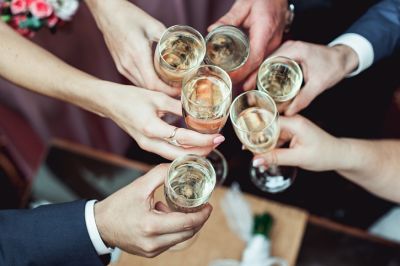 Toasts are considered a fundamental part of a wedding reception, but it’s easy to get the jitters if you’re new to the practice. If you’re a close family member or part of the wedding party, however, you might be called to take the mic and offer some good wishes to the newlyweds. It's helpful to understand the purpose of toasting, as well as who’s usually involved and when each toast will occur during the evening. A few pointers will also aid you in offering an unforgettable bon mot that’s also in good taste.
Toasts are considered a fundamental part of a wedding reception, but it’s easy to get the jitters if you’re new to the practice. If you’re a close family member or part of the wedding party, however, you might be called to take the mic and offer some good wishes to the newlyweds. It's helpful to understand the purpose of toasting, as well as who’s usually involved and when each toast will occur during the evening. A few pointers will also aid you in offering an unforgettable bon mot that’s also in good taste.
Who Typically Toasts a Newlywed Couple?
Typically, it’s the best man’s words that come to mind when people think of wedding toasts. Yet as Brides writer Jaimie Mackey points out, these can also involve a couple’s parents, other honor attendants and finally words by the newlyweds themselves. She provides a standard breakdown of who offers their toasts during the evening:
- A welcome toast by one of the couple’s parents
- Honor attendants toast near the end of dinner hour
- Newlyweds thank their guests after honor attendants speak
Mackey further explains that honor attendants usually speak immediately after the guests have been served their food, but that's generally the case with a traditional sit-down meal. For buffets, potlucks, family-style meals, heavy appetizers, "cake and punch" receptions or food truck catered after-parties, you should wait until everyone has filled their plates and is seated before toasting. The happily wedded pair can make their remarks either immediately after the honor attendants are done or shortly before they cut the cake.
When the Spotlight’s on You
If you’re one of the honor attendants, you might get anxious at the thought of all eyes being on you as you speak. You may also be uncertain about what you should say when you’re offering your toast. Thankfully, there’s plenty of advice around to help you figure out what kinds of sentiments to express, along with potentially embarrassing blunders to avoid. In a 2012 New York Times piece, writer Bruce Feiler lays down some essentials to observe:
- Stay on topic and focus only on the happy couple.
- Do not mention their former partners or spouses.
- Speak to the room, and wait until the end to pick up your glass.
- Steer clear of suggestive language or innuendos.
- Go easy on the alcohol before it’s your turn to talk.
- Avoid telling embarrassing childhood stories.
- Don’t make jokes about marriage, especially of the “ball and chain” variety.
Try These Wordsmithing Suggestions
Besides his fundamental guidelines, Feiler also gives a few pointers to aid flustered honor attendants in crafting their remarks. His “3-1-2” formula can serve as inspiration when you sit down to write. First, use the opening portion of your remarks to relate a warm or funny memory about the couple while speaking in the third person. Secondly, share something you genuinely admire about the happy pair while talking in the first person. Lastly, offer your well-wishes directly to the couple in the second person. If you need to borrow a blessing for your final words, The Knot lists several dozen suggestions on its website. There’s also a 2014 Huffington Post article that provides a basic template to assist you in penning your comments. While you’re at it, make sure your toast stays within three to five minutes in length.
Composing a heartfelt toast takes a little bit of preparation, but it’s easier than you might think. Best practices include keeping your words tasteful, G-rated, on-topic and focused on positive aspects of the new couple’s history and relationship. Once you’ve ended with well-wishes or blessings and raised your glass, you’ll leave a memorable mark on the celebration in all the right ways.
Add Your Comment